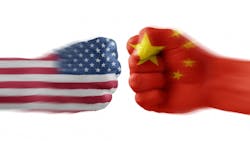American companies have been on pins and needles waiting for a truce to be declared on the Sino-US tariff war. However, they should be more concerned about Trump’s war against Huawei, as the White House announced on Monday that it has banned American high-tech suppliers from selling its semiconductor chips, Android operating systems, and test equipment to the world’s largest telecommunications equipment provider.
On top of Monday’s announcement, Trump has also been strong-arming other countries not to use Huawei equipment, claiming the company creates backdoors in its 5G networking equipment that allow the Chinese government to spy on foreign governments and companies. And to make matters worse, the U.S. Justice Department accuses Huawei’s CFO, Meng Wangzhou, who awaits extradition in Vancouver, of violating US sanctions on Iran.
So far, the Chinese government has been relatively quiet, probably not wanting to stir the pot while tariff discussions were still in progress. But this, I believe, is the calm before the storm. China has never just sat back and taken a beating.
There’s no question that President Xi sees these attacks on Huawei as a slap in the face. The high-tech conglomerate is China’s darling and torchbearer for innovation, entrepreneurship, and all the goodwill that Chinese communism has to offer. China will retaliate hard and long.
China believes in tit-for-tat. Trump raises tariffs, China raises tariffs. Canada arrests Meng, China arrests two Canadian citizens in China. So, what’s in store for American companies?
For one, all U.S. Fortune 1000 C-level executives should think twice about traveling to China. Though I’m not a well-known businessperson, I still cringe in fear of detention as I wait for Chinese immigration officials to stamp my passport before leaving China. Look for Beijing to also deny visa extensions to and expel American expatriates living and working in China.
Second, the Chinese love to practice what I term bureaucratic harassment. One of my clients, a Maine lobster fisherman, lost a $20,000 shipment, as Chinese customs “accidentally” left the highly priced cargo to sit outside on a sweltering July day in Shanghai. The fisherman lamented, “This is a first for me in over 10 years of working with the Chinese. I don’t know what to call it. An accident? Revenge for Trump?” The incident occurred the day after the U.S. raised tariffs on China.
China will undoubtedly close a few thousand McDonald’s and Starbucks stores for “health-related” reasons. And they’ll find similar reasons—safety, expired business license, unpaid taxes—to stop the sales of shoes, smartphones, tractors and just about anything else made by a U.S. company in China. Imagine what this would do to the equity markets and the billions of dollars’ worth of market capitalization of America’s greatest companies.
We are still a long way from a doomsday scenario with China, but let’s examine what one would look like. China mines and exports over half the world’s supply of many rare earth elements, like germanium, magnesium, and phosphorus. What if China decided to stop supplying U.S. companies? China controls 80% of the world’s supply of tungsten. It’s used to produce electrical wires and added to steel to make it stronger. Hundreds, if not thousands, of supply chains would be affected if China decided to stop shipping the metal to U.S. manufacturers.
Or consider our pharmaceutical industry, which is totally dependent upon China. The country supplies 40% of the active pharmaceutical ingredients in everyday medicines you and I take: antibiotics like penicillin, birth control pills, aspirin, vitamins A and C, and many cancer, diabetes, and blood-thinner drugs. They supply the big pharmaceutical drug makers like Teva Pharmaceutical, Johnson & Johnson, and Novartis. What would happen if … ? I don’t want to even fathom the idea.
U.S. Secretary of State Wilbur Ross said in an interview in 2018 that China was “running out of bullets,” meaning that it could only tax $100 billion worth of U.S. imports vs. the over $500 billion the U.S. buys from China. I think it’s clear now how much power, influence, and interdependency China has on the US.
China wields enough ammo to affect America’s supply chains, stock markets, and the daily lives of tens of millions of Americans who rely on prescription drugs.
Let’s hope, as with the tariff war, that both countries will seek common ground in solving the Huawei problem. I’m confident cooler heads will prevail.
Stanley Chao is managing director of All In Consulting, assisting western companies in their China business, and the author of Selling to China: A Guide for Small- and Medium-Sized Businesses. He resides in Los Angeles.
About the Author
Stanley Chao
Managing Director
Stanley Chao is managing director of All In Consulting, assisting western companies in their China business, and the author of Selling to China: A Guide for Small- and Medium-Sized Businesses. He resides in Los Angeles.
